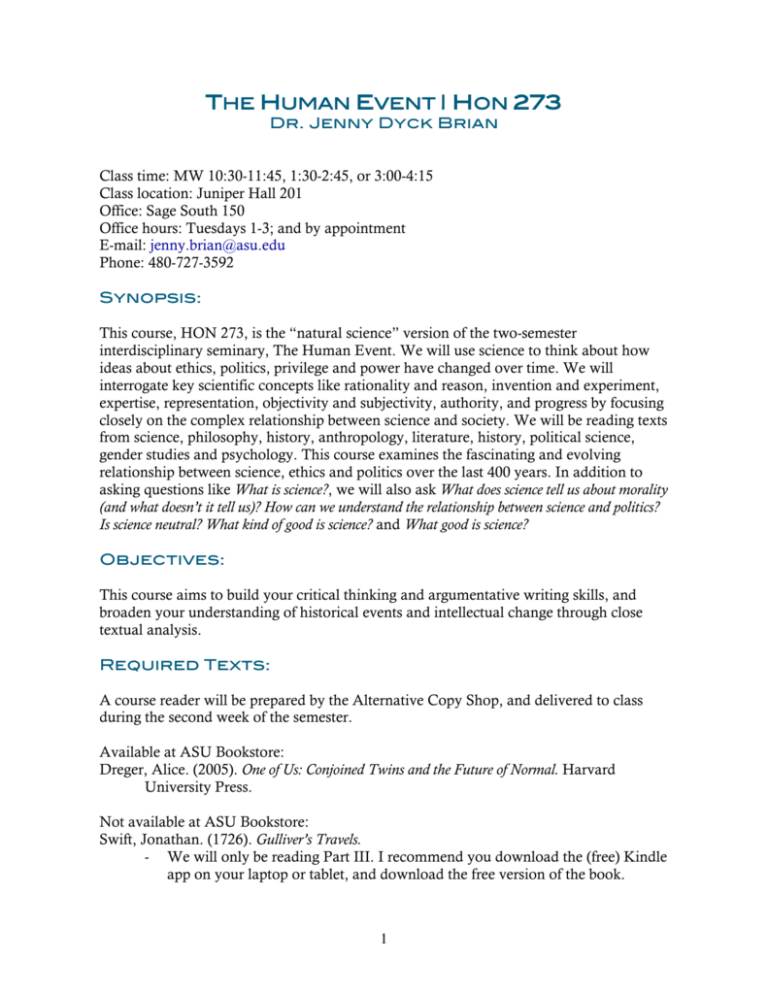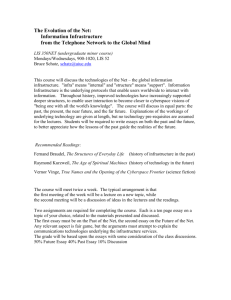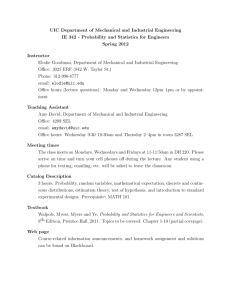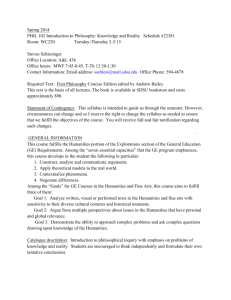the human event | hon 273
advertisement

THE HUMAN EVENT | HON 273 Dr. Jenny Dyck Brian Class time: MW 10:30-11:45, 1:30-2:45, or 3:00-4:15 Class location: Juniper Hall 201 Office: Sage South 150 Office hours: Tuesdays 1-3; and by appointment E-mail: jenny.brian@asu.edu Phone: 480-727-3592 Synopsis: This course, HON 273, is the “natural science” version of the two-semester interdisciplinary seminary, The Human Event. We will use science to think about how ideas about ethics, politics, privilege and power have changed over time. We will interrogate key scientific concepts like rationality and reason, invention and experiment, expertise, representation, objectivity and subjectivity, authority, and progress by focusing closely on the complex relationship between science and society. We will be reading texts from science, philosophy, history, anthropology, literature, history, political science, gender studies and psychology. This course examines the fascinating and evolving relationship between science, ethics and politics over the last 400 years. In addition to asking questions like What is science?, we will also ask What does science tell us about morality (and what doesn’t it tell us)? How can we understand the relationship between science and politics? Is science neutral? What kind of good is science? and What good is science? Objectives: This course aims to build your critical thinking and argumentative writing skills, and broaden your understanding of historical events and intellectual change through close textual analysis. Required Texts: A course reader will be prepared by the Alternative Copy Shop, and delivered to class during the second week of the semester. Available at ASU Bookstore: Dreger, Alice. (2005). One of Us: Conjoined Twins and the Future of Normal. Harvard University Press. Not available at ASU Bookstore: Swift, Jonathan. (1726). Gulliver’s Travels. - We will only be reading Part III. I recommend you download the (free) Kindle app on your laptop or tablet, and download the free version of the book. 1 Schedule of Readings: Jan 7: Introduction to the class. Seigel, A. “The Life Lessons Hidden in Reality TV.” New York Times. 30 November 2012. Available online at http://www.nytimes.com/2012/12/02/magazine/the-life-lessonshidden-in-reality-tv.html?pagewanted=all First reading response: Read Samuel Butler’s Elephant in the Moon (1822) and write 300 word analysis. What are the key themes and ideas? Post to Blackboard by Saturday, January 12. THEORIES OF KNOWLEDGE (HOW DO WE KNOW WHAT WE THINK WE KNOW?) PART I: EMPIRICISM Jan 9 Newton, Philosophiae Naturalis Principia Mathematica (1687) Locke, John. An Essay Concerning Human Understanding (1694) Jan 14 Addison, J. “The Pleasures of the Imagination.” The Spectator (1712) Hume, D. A Treatise of Human Nature. (1739) PART II: RATIONALISM Jan 16 Descartes, Rene. Meditations On First Philosophy (1641) Kant, I. “What is Enlightenment?” Jan 21 Martin Luther King, Jr. Day. No classes. HUMAN NATURE Jan 23 Hobbes, Thomas. Leviathan. (1651). Rousseau, JJ. Discourse on Inequality (1755) Essay #1 topics distributed MORAL EPISTEMOLOGY Jan 28 Hume, Enquiry Concerning the Principles of Morals, I and II (1751) Are morals founded in reason or sentiment? Jan 30 Writing workshop #1 Feb 4 Kant, Groundwork of the Metaphysics of Morals, Preface and I (1785) Aim of the book: “nothing more than the search for and establishment of the supreme principle of morality” (4:392). POLITICS AND MORALITY Feb 6 Wollstonecraft, M. The Vindication of the Rights of Woman (1792) 2 Optional: Dewey, J. (1916). Democracy and Education. Essay #1 due at 3pm on 8 Feb Feb 11 Feb 13 Marx (pp 31-66) Engels, “The Patriarchal Family” Durkheim, “Anomie and the Modern Division of Labour” NATURAL SELECTION Feb 18/20 Darwin, C. (1859). On the Origin of Species by Means of Natural Selection, or, The Preservation of Favoured Races in the Struggle for Life. London: John Murray. “FAVOURED” POPULATIONS Feb 25 Quetelet, A. (1849). Letters Addressed to H.R.H. the Grand Duke of Saxe Coburg and Gotha, on the Theory of Probabilities, as Applied to the Moral and Political Sciences. London: Layton. Galton, F. (1869). Hereditary Genius: An Inquiry into Its Laws and Consequences. London: Macmillan. UNDERSTANDING THE SELF Feb 27 James, W. “The Self and Its Selves” (1890) Perkins Gilman, Charlotte. “The Yellow Wallpaper” (1892) Essay #2 topics distributed Mar 4 Cooley, C. “The Looking Glass Self” (1902) Supreme Court decision Buck vs. Bell (1927) Mead, GH. “The Self, the I, and the Me” (1929) Mar 6 Writing workshop #2 WEEK 10: Spring break. No classes. Have fun and be safe! THE NATURE AND STATUS OF SCIENCE AND ITS CLAIMS TO AUTHORITY Mar 18 Dewey, J. “Science as Subject-Matter and as Method” (1910) Weber, Max. “Science as a Vocation” (1917); “The Spirit of Capitalism, and the Iron Cage” Mar 20 Geertz, C. (1957). Ritual and Social Change: A Javanese Example. American Anthropologist 59(1): 32-54. Essay #2 due at 3pm on 22 Mar 3 POSTMODERNISM Mar 25 Mar 27 De Beauvoir, S. (1949). The Second Sex. Firestone, S. (1970). The Dialectic of Sex. Chapter 1. Foucault, M. “Biopolitics and the Carceral Society”, “Power as Knowledge” Lorde, A. “The Master’s Tools Will Never Dismantle the Master’s House” (1984) CONSTRUCTING, MANUFACTURING DIFFERENCE Apr 1 Haraway, D. “Situated Knowledges.” (1988) Apr 3 Orr, J. “Theory on the Market: Panic, Incorporating.” Social Problems. Vol. 37, No. 4 (November 1990): 460-484. This American Life. “81 words” Chicago Public Radio Apr 8 Apr 10 Dreger, A. One of Us. (2005) Dreger, A. One of Us. (2005) APR 15 Duster, T. “Race and genetics” Science 2000. Kahn, J. “Race, Pharmogenomics, and Marketing: Putting BiDil in Context.” American Journal of Bioethics Vol. 6, 2006. PROGRESS AND DEVELOPMENT: WHAT KIND OF GOOD IS SCIENCE? WHAT GOOD IS SCIENCE? Apr 17 Swift, J. (1726). Gulliver’s Travels. Part III. Essay #3 topics distributed Apr 22 Roy, A. (1999). “The Greater Common Good.” Apr 24 Writing workshop #3 THE END. Sniff. Apr 29 Course wrap-up and evaluations. Essay #3 due on Monday, May 6 at 3pm. Assessment: This course will be a dynamic, discussion-based class that demands a high level of engagement from the students. Students are required to complete all assigned readings and come to class prepared for discussion. The final grade for the course will be based on participation (30%), three written papers (60%), reading responses (10%). 4 Participation (30%) Your participation grade will be assessed by the quality (not quantity) of your in-class contributions and your participation in in-class group activities. Every day, I will assign you a grade out of 3 for the day. I will periodically post your score on Blackboard. You will sign up for two classes for which you are responsible for preparing discussion questions for the reading(s), and one class for which you will lead the class discussion for 20 minutes. On writing workshop days, the introductory paragraph and outline you hand in will count for your participation grade on that day. Short papers (60%) Each student will write 3 six-page papers (20% each). Short papers are an opportunity to demonstrate your ability to critically analyze the texts, to synthesize ideas and concepts, and develop insightful, original arguments. Your papers will be graded on accuracy of interpretation and understanding, quality of argument, expression (tip: The Barrett Writing Center will welcome you with open arms!), and originality. I will provide a choice of essay prompts and further information two and a half weeks before each deadline. Reading responses (10%) We will occasionally do reading response activities, in which I will ask you to reflect on and respond to the author’s arguments, or compare two readings. These will either be assigned in advance or as an in-class writing activity. While reading, ask yourself the following questions: - What is a difficult question raised in or by the reading, and why is it difficult? - What is an interesting point raised in or by the reading, and why is it interesting? - What controversial claims does the author make, and what are the possible objections? Asking yourself these questions forces you to take a stance of curiosity towards the reading, and will help you prepare thoughtful responses to our texts. Extra Credit Assignment: Option 1 (strongly recommended): Attend Jackie Orr’s presentation on April 25th and write a 500-word response. Further details about the assignment will be provided in class, but here are the details of the presentation: Dr. Jackie Orr, Syracuse University "Slow Disaster at the Digital Edge" April 25, 7:30 pm 5 Marsten Exploration Theater ISTB4, Tempe Campus Jackie Orr teaches and writes in the fields of cultural politics, technoscience and psychiatry, and critical body studies. Her book Panic Diaries: A Genealogy of Panic Disorder (2006) looks at how histories of militarization, cybernetics, and technoscientific desire animate the language and experience of psychic dis-ease. For the past 20 years, she has experimented with performance and textual/visual collage as alternative methods for making public memory and insurgent scholarly knowledges. Her most recent performance piece, Slow Disaster at the Digital Edge, explores the deep time of catastrophe and the BP oil disaster in the context of digital redistributions of memory, trauma, and time. She is an associate professor of sociology at Syracuse University. Option 2: Take a trip to the Phoenix Art Museum and choose one to two pieces of artwork (from 1600 to now) and write a 500-word analysis. Detailed instructions will be provided in class. Policies: • Attendance: Daily attendance is required. Each student is allowed two absences, with no explanation necessary. Additional absences will negatively affect your final grade (e.g., taking you from a B to a B-). The instructor reserves the right to fail those who miss twenty percent of the class meetings or more for any reason. • Short paper drafts: I do not read drafts, but if you come see me, I will give you detailed feedback on your thesis statement and outline. • Late penalty for assignments: You will be given two no questions asked, no penalty extension days to use when you wish. They must be used together, on one assignment. Once the two days are used up, assignments handed in late will be accepted with a penalty of 10% per day. One day = 24 hours, therefore if you take a two day extension on a paper due on a Friday at 5pm, you will be required to submit the paper to Blackboard by 5pm Sunday and drop off a paper copy by 8:30am Monday. • Graded papers: I will return graded papers no later than three weeks after you submit them (with the exception of the final paper, which will be available for you to collect the following term). • Regrading policy: If you think the grade I gave you on an assignment is wrong, you may submit it to be regraded. It must be resubmitted within one week, with a paragraph explanation as to why you think my assessment was incorrect and why the paper deserves a different grade. Please refer to our grading rubric when making your case and remember that grades are earned, not given. 6 • Electronic devices: You are welcome to use a laptop or tablet in class if you are referencing relevant readings. Do not use the laptop or tablet to check e-mail or Facebook or shop for shoes because that will significantly affect your overall participation grade. (It will affect your grade for the worse, just to be clear). • Course content: Some of the assigned texts contain adult content, such as sexuality, coarse language and violence. If you are not comfortable with such themes and content, please come see me and we will discuss possible options and alternatives. • E-mail etiquette: Please include a salutation (“Dear Dr. Brian”, for example), and refrain from using text message abbreviations. I know it’s e-mail and we all receive hundreds of them a day/week, but good communication skills are important. • Unless you are otherwise instructed, all assignments are to be submitted to Blackboard and directly to the Instructor. • Reading assignments are to be completed in advance. You must come to class prepared and ready to participate in discussion. Please bare in mind that oftentimes philosophical literature must be read twice or three times to facilitate comprehension. • Students with permanent or temporary disabilities who would like to discuss course requirements and accommodations are asked to see the instructor within the first week of class. • The syllabus is a contract between the student and the teacher. If you come back on Wednesday, you agree to abide by the terms I have laid out in the syllabus. While I reserve the right to make small changes to the reading schedule, policies or due dates, I agree to not make any significant changes to the syllabus without consulting the class. Barrett Writing Center The writing center is staffed by Barrett students who have completed both sections of The Human Event. They are available for individual tutoring to help you improve your writing and critical thinking skills. For more information, go to http://barretthonors.asu.edu/academics/barrett-writing-center/. Academic Integrity If you submit work that is not your own, you will be fully disciplined in accordance with university policies. Cheating, plagiarism, or other forms of academic dishonesty are strictly forbidden and will result in a failing grade for the assignment, the class, and disciplinary action with the Dean. It is your responsibility to be aware of, understand, and adhere to the rules and regulations of The Barrett Honors College. 7 Multiculturalism Barrett, the Honors College at Arizona State University, is committed to creating a multicultural learning environment, which is broadly defined as a place where human cultural diversity is valued and respected. I hope that you will contribute your unique perspectives to this effort by respecting others’ identities and personal life histories and by considering and raising issues related to multiculturalism and diversity as appropriate in our course discussions. Thoughtful discussions on multiculturalism and diversity will enhance each person's experience within and beyond the classroom. 8







